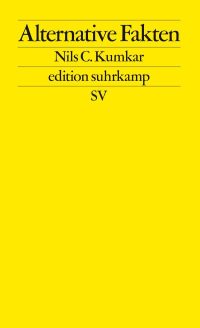
The popularity of terms like “post-truth” or “alternative facts” seems to indicate conflict about the reality of reality. Consequently, the debate on “alternative facts” is dominated by psychological and epistemological inquiries. These perspectives however do not suffice to understand why “alternative facts” have such unsettling effects on public discourse. Nils Kumkar’s new book therefore investigates alternative facts from a sociological, communication theory perspective: What is fought about and what is agreed upon when alternative facts are shaping the debates? What is their communicative function?
In case studies from the debates on the Corona pandemic, climate change, and the crowd size of Donald Trumps inauguration ceremony, the book shows that “alternative facts” should not be understood as fragments of parallel epistemic universes, to which relevant parts of the population have supposedly relocated. Rather, they function as discursive smoke bombs in polarized debates. Their central function is not to make people believe in the wrong things, but to protract the communication of the agreement on a given situation and thereby delay decision making. They do not contribute to the construction of alternative realities, but rather to situational disorientation, allowing to keep going – against better judgement.
Contact:
Dr. Nils C. Kumkar
SOCIUM Research Center on Inequality and Social Policy
Mary-Somerville-Straße 9
28359 Bremen
Phone: +49 421 218-58620
E-Mail: kumkar@uni-bremen.de











